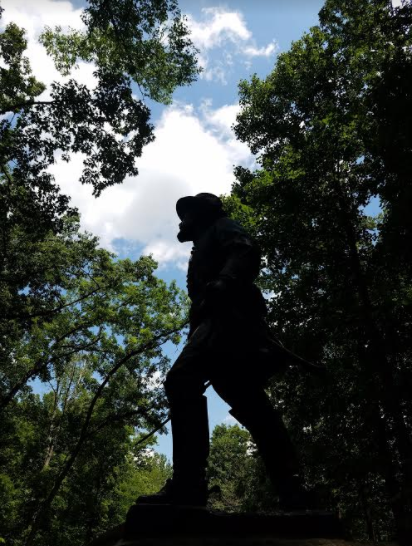Revisiting Maj. William Wells at Gettysburg

Several years ago, I posted a picture of the William Wells monument at Gettysburg. When going back through some of the pictures I took last week while I was there for the anniversary, I came across another one that I think is worth sharing, along with his story.
Wells was born in Waterbury, Vermont on December 14, 1839. He came from a well to do family and attended schools in his native state and New Hampshire. With his education complete, Wells became a merchant in Burlington, Vermont. In the fall of 1861, he enlisted as a private in the 1st Vermont Cavalry, the only mounted unit to be raised by the state during the war. Although he lacked formal military training, Wells possessed natural leadership ability. Within a few months, he was promoted to lieutenant and then to captain.
Wells and the Green Mountain Boys served in the Shenandoah Valley against “Stonewall Jackson” and with John Pope’s Army of Virginia during the Second Manassas Campaign. In December, 1862 Wells was promoted to Major. Eventually assigned to Brig. Gen. Elon Farnsworth’s brigade of Brig. Gen. Judson Kilpatrick’s Third Cavalry Division, Wells led one of the regiment’s battalions at Gettysburg. Farnsworth rode with his battalion during his fateful charge on July 3 in which Wells later received the Medal of Honor.
The Vermonter participated in the ill-fated Kilpatrick-Dahlgren Raid in early 1864 and fought in the Overland Campaign. On June 3, the veteran officer assumed command of the 1st Vermont. Wells returned to the Shenandoah Valley that autumn to serve with Maj. Gen. Philip Sheridan’s army. At the Battle of Third Winchester on September 19, Wells assumed command of Col. George Chapman’s brigade when Chapman was wounded. Less than a month later, Wells’ regiments played a critical role in the Union victory at the Battle of Tom’s Brook. Wells continued to serve in this capacity until Lee’s surrender at Appomattox the following spring. When he was mustered out in 1866, Wells had risen to the rank of Brevet Major General.
Returning home, Wells entered the world of state politics. He spent the next six years as Vermont’s Adjutant General. When he left the post in 1872, he became a collector of internal revenue, a position he would hold for over a decade. In the late 1880s he was elected to a term in the state senate. He passed away in New York City on April 29, 1892 and rests in Lakeview Cemetery in Burlington.
A twin statue of General Wells of the one at Gettysburg is in Burlington, Vermont.